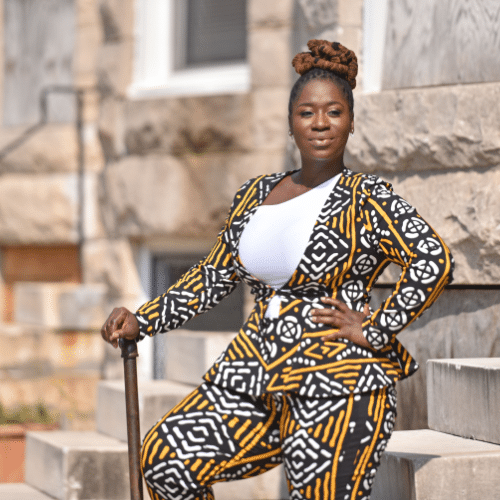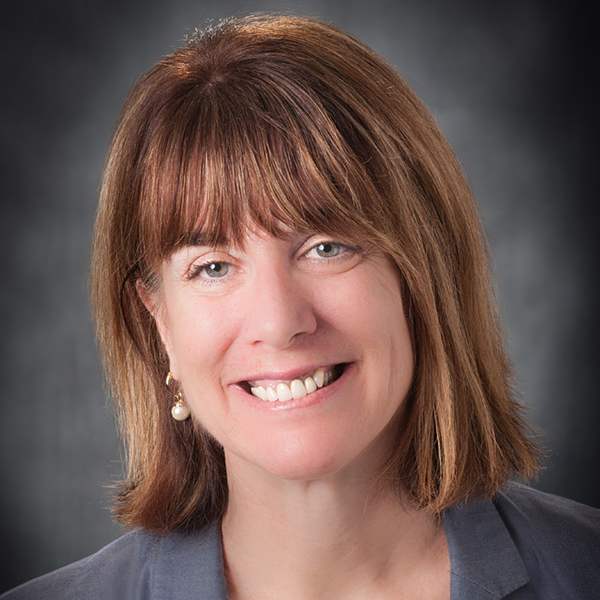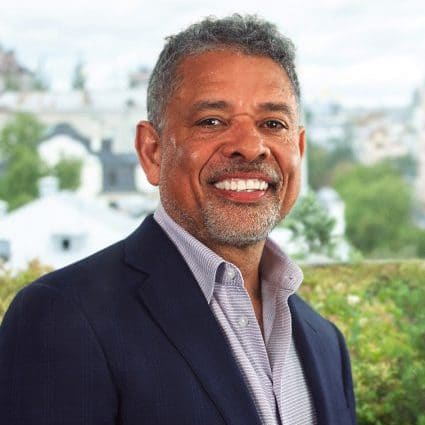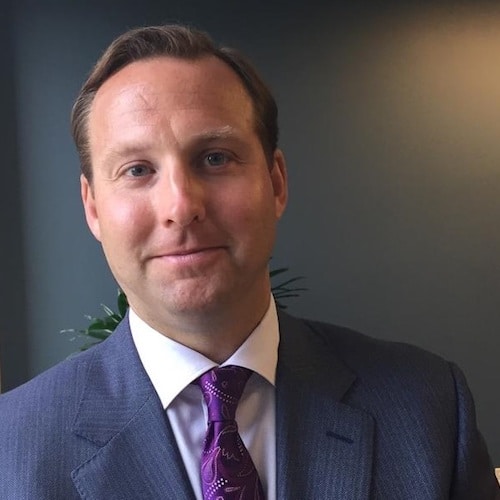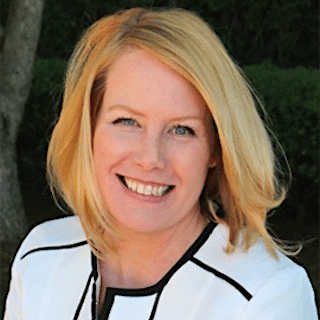
Jill Ferrari is all about creating impact where it is needed.
An attorney with twenty-five years of real estate development and operations experience, she is also the co-founder (with Shannon Morgan) of Renovare Development, a woman-owned, social impact, real estate development company focused on transformational projects in Michigan. To say Jill knows this space would be an understatement. She has worked in consulting and community development, managed complex brownfield redevelopment projects in multiple states, and she has experience forming complicated capital stacks that combine both federal and local funding with unique financing programs and conventional debt.
Previously Jill was CEO of Shelbourne Development, working on affordable housing, and before that, CEO at Michigan Community Resources, working on community and economic development. And as the former director of community development for Wayne County, MI, she managed the distribution of over 100 million in federal funds to various projects and communities, including the development of housing for victims of domestic violence and returning citizens. Jill also serves as co-chair of the Urban Land Institute (ULI) Michigan District Council and is the founder of ULI Michigan’s Women’s Leadership Initiative, designed to promote leadership for women in the real estate industry. Plus, she is a member of the ULI Michigan Small Scale Development Local Product Council and a member of the Women’s Development Collaborative.
Read the podcast transcript here
Eve Picker: [00:00:09] Hi there. Thanks for joining me on Rethink Real Estate. For Good. I’m Eve Picker and I’m on a mission to make real estate work for everyone. I love real estate. Real estate makes places good or bad, rich or poor, beautiful or not. In this show, I’m interviewing the disruptors, those creative thinkers and doers that are shrugging off the status quo, in order to build better for everyone. If you haven’t already, check out all of my podcasts at our website RethinkRealEstateForGood.co, or you can find them at your favorite podcast station. You’ll find lots worth listening to, I’m sure.
Eve: [00:01:06] Jill Ferrari is the developer who believes in community. She and her partner, Shannon Morgan, co-founded Renovare Development in Detroit just a few years ago. They focus on transformational, mixed-use projects in urban areas and rural main streets that meet community needs. Both Jill and Shannon bring significant experience to their new venture, including private real estate. Government roles and non-profit community development. This gives them the broad perspective necessary for the social impact projects they are developing. Their network of municipal contacts and professional service providers are their secret sauce. These connections provide access to redevelopment opportunities throughout the state of Michigan and beyond. Their first six projects, valued at $88 million, are well underway. Not shabby for a woman owned start up. You’ll want to hear more.
Eve: [00:02:16] If you’d like to join me in my quest to rethink real estate, there are two simple things you can do. Share this podcast and go to rethinkrealestateforgood.co, where you can subscribe to be the first to hear about my podcasts, blog posts and other goodies.
Eve: [00:02:38] Hi, Jill, thanks so much for joining me today.
Jill Ferrari: [00:02:43] Thanks for having me.
Eve: [00:02:45] So you’re a real estate developer with a mission that’s pretty solidly grounded in community. Tell me why this is important to you.
Jill: [00:02:56] When we launched Renovare Development, we knew as mothers that we were uniquely qualified to solve problems through commercial real estate development. As mothers, as women who are caregivers for both our children and our parents, we are cooks, we are problem solvers, we’re executives. We juggle so many different tasks in our lives. We approach commercial real estate development the same way. We look at how communities need to solve certain problems and how real estate can help solve those problems for communities. And it’s just a unique perspective that we are deeply committed to applying in our projects.
Eve: [00:03:44] Most developers need dose of motherhood, right?
Jill: [00:03:48] Or womanhood. You know, I think that we just have a very unique perspective that allows us to see ourselves and our parents and our children in projects. So when it comes to multigenerational products like ADUs and granny flats, or the types of programming in commercial retail centers, we are thinking about our children, we are thinking about our parents and it helps create more sustainable, more community driven projects.
Eve: [00:04:19] You co-founded Renovare with your partner, Shannon Morgan, and when was that? And how did the two of you meet? And why?
Jill: [00:04:27] Right. We met during the crash of 2008, 2009. I was working in community development, I was the head of community development for Wayne County, Michigan. We received a large package of stimulus funds at the time. Shannon was a C-suite individual at a large development company, and she completed a few projects for me. Single family rehab, mostly. And she just stood out as a problem solver. A lot of the developers were really struggling to use those federal funds correctly and within compliance. And Shannon and her team were just really skilled at meeting compliance requirements and getting that money out the door appropriately. And we developed a relationship. And 10 years later, we were working at the same affordable housing development company and just had a really similar vision on what it meant to create transformational projects that really solved community needs. And I think a lot of that is that mother’s perspective, that woman’s perspective, on how development should be done. And we’ve been together since 2019, and we rarely have different perspectives on how things should be done. So, it’s really nice a few years into your partnership that you still think you chose the right person.
Eve: [00:05:51] That’s really great. It’s a perfect marriage. And when did you launch Renovare?
Jill: [00:05:55] We formed in 2008 but didn’t officially launch until 2019.
Eve: [00:06:01] Okay. So, why Michigan? You’re based in Michigan, you’re in Detroit, you’re sticking to Michigan.
Jill: [00:06:08] We have decided to start in Michigan because of our relationships. We have chosen projects, not really because we’ve sought out the location, but because we have been invited. We’ve been invited to a community by the municipality to solve a certain housing need, or we’ve been invited to a community by a major employer to partner on a project or by a local non-profit. All of our projects are partnerships with some local employer agency non-profit who has identified a community need that needed to be solved. And when we launched and made it public what we were trying to accomplish, the invitations were endless. And we’ve chosen these first six projects because we believe deeply in the communities that they’re located in and the partners that we have. And we would love to expand outside of Michigan but the need for housing here and community centric commercial spaces is so deep that we could spend our entire careers and leave legacies for our children just by working in the state of Michigan. But we have some great relationships outside of Michigan. Women across the country that we are connected to that have invited us to come work on housing in their states, and we hope to get to those projects.
Eve: [00:07:30] So what’s the overall strategy for the company?
Jill: [00:07:35] When the company launched, we made a commitment to each other that we would focus on a diverse pipeline of projects. We had seen colleagues really focus on just multifamily or just low-income housing tax credits, and we knew that in order to be sustainable, we needed to pursue a diverse mix of product types. So, in our first six projects, we have a single-family development in Ypsilanti, Michigan. We have long term hold projects, mixed use developments in multiple cities, and we have a low-income housing tax credit project. And the reason that we formulated our business plan that way is that the cash flow is diverse from the different product types, and we wanted to make sure that we maintain that diversity over time because it makes us stronger and makes our cash flow more sustainable.
Eve: [00:08:32] So, some of them are for sale, some of them for rent. Some of them are going to be completed before others. There are developer fees, there’s income from rental or all of that mix of cash flow.
Jill: [00:08:44] Exactly. Some are tax credit projects. Some have more market rate units than others. Most of our, almost all of our projects, have workforce housing as a component of the project because we both come from workforce families. We are blue collar born and raised. And we believe that there are just thousands of Michigan families out there that fit that workforce demographic that can’t afford to buy a home, and we want to be a part of that solution.
Eve: [00:09:14] So actually, I’m going to diverge a little bit. People talk about workforce housing versus affordable. What’s the difference?
Jill: [00:09:21] In our definition affordable housing is from roughly 30 percent area median income to 60 percent area median income. Workforce housing is 60 percent area median income to 120 percent area median income. And that’s where most of our housing is focused.
Eve: [00:09:41] Ok, so where I live, they consider that affordable housing. And the lower end would be really sort of dire need target housing. Ok, got it. These are complicated projects. How do you finance them? Like, I could imagine that the financing of these projects takes up more time than anything else.
Jill: [00:10:04] I think that’s where we’ve spent the majority of the past two years. First, it was identifying the communities and the partners that we wanted to work with, and the next step is the capital stack and really understanding how these pieces work together. Shannon has tremendous experience in low-income housing tax credit ownership in other projects in Michigan, and my background, I’m a lawyer by training but my background has really been about creating unique financing solutions for real estate projects. So, our partnership is very compatible in what we’re trying to accomplish here. But it is a very difficult process to figure out how to stack these deals to make them work. And it’s why most market rate folks don’t spend the time because the fees are less, the cash flow is not as strong, but they are transformational projects that mean everything to the community that they’re in.
Eve: [00:11:01] So to keep a housing project affordable means that equity investors can’t get as much return. I’m really surprised at how many people don’t understand that. That, you know, the more return you give a bank or an investor, the greater the rent or the sale price is going to be, and the less affordable it’s going to be. So, who’s out there who helps kind of fill that capital stack for you
Jill: [00:11:25] In the state of Michigan we are using a local tool, a tax increment financing tool, that is helping create affordability in the single-family units. It was originally written as a brownfield redevelopment financing tool. However, cities in the state of Michigan are utilizing a piece of that legislation that talks about economic development to create workforce housing. So, we’re kind of left, as developers, to using tools as creatively as the state and the community that we’re in will let us to create workforce housing. But to your point, there aren’t a lot of gap financing tools for this population. There aren’t a lot of philanthropic dollars outside of entitlement communities, you know, large urban areas. So, it is really difficult, and we filled the gap with corporate sponsors, we’ve filled the gap with local foundations as equity partners, and it’s just a lot of work.
Eve: [00:12:30] You’ve got six projects that you’re pushing forward totaling how much value?
Jill: [00:12:36] Eighty-eight million in total development costs.
Eve: [00:12:39] And when do you expect the first one will break ground?
Jill: [00:12:43] We are hoping to break ground in Ypsilanti in the summer and the rest of the projects will follow throughout the fall and next year.
Eve: [00:12:53] Okay, and then do you expect your pipeline to grow once that’s underway?
Jill: [00:12:58] Yes. Once again, following the sustainable cash flow model, we’ll be looking for some single-family developments to close in 2024. And then after that, we’ll kind of go back to some mixed-use projects. And again, looking in the state of Michigan, but also, we are partner driven. So, if there’s a partner that pulls us out of the state of Michigan or a community that desperately needs us, we would look elsewhere too.
Eve: [00:13:25] Ok, I want to just shift gears a bit and talk about some of the challenges you’ve been confronted with as a woman, as a developer working in community projects, all of those things. You talk about challenges that you’ve been confronted with, that perhaps a white man would not have been confronted with.
Jill: [00:13:47] Yeah. Fundraising for the development company has been one of the most exhausting and educational experiences I’ve ever gone through. And I have been in real estate for over twenty-five years. The capital world, VC world and angel investment world is really not suited for women commercial real estate developers. It’s a high-risk industry. Investors don’t really understand how to evaluate the opportunity. It’s not an app that anyone can use. Very different from some of the successful tech apps that have raised millions of dollars. So, this space is definitely a very lonely space. And friends and family are a very strong audience for investment, but we have a very strong identity. We are definitely looking to raise significant cash flow and provide an attractive return. But at the same time, we are picking projects based on partnership and community need. So, a lot of investors don’t really understand what we’re trying to do or why we’re trying to do it. So, it’s really difficult to raise money, and it’s been a journey. But we have met some women along the way that are in this space that have been tremendous resources, you included. I think that this space is growing. There’s a lot of emerging women commercial real estate developers who are looking to launch and do their first projects. And I think this growing ecosystem of support for women in commercial real estate is getting stronger, and I’m just happy to see it.
Eve: [00:15:36] It’s very exciting. What about when you go to a bank for a loan? Do you think you’re treated any differently there?
Jill: [00:15:44] It depends on whether we are meeting their needs. So when we talk to banks that have Community Reinvestment Act obligation and we’re working in one of their target communities, the red carpet is rolled out. If we are looking in small towns across Michigan that are not part of anybody’s targeted lending strategies, it is really difficult to get lenders interested in projects. And that’s where we see, one of the biggest challenges in what we do, is that the need for housing and the appetite for lenders is completely mismatched. And we are hoping that the commercial lending industry evolves where there are loan loss reserves and risk management strategies so lenders will be more likely to lend in these smaller towns because there are employers across the state of Michigan who are hoping to expand, are in a position to expand, but are choosing not to because of the lack of housing.
Eve: [00:16:49] Interesting. That’s really tough. So, right now you’re raising funds for your company and this first set of projects on Small Change. Why crowdfunding in amongst all of this?
Jill: [00:17:03] Because our mission is to help solve community problems, we wanted to incorporate the community into our company, and we’re really interested in the way that Small Change was structured and the audience that was being reached and wanted to tap into the network of individuals across the country that are passionate about supporting women in commercial real estate. And honestly, part of our hope is to build momentum for other commercial real estate developers that are women, that they’ll follow in our footsteps and be able to raise funds through the community to help them launch.
Eve: [00:17:47] Well, it’s all really pretty exciting. I’m very excited for you. It’s a great thing to have a new company to work on. But what’s your really big, hairy, audacious goal? Where would you like to be in five 10 years?
Jill: [00:18:03] Oh, I want to take my child on a tour of completed projects, and I want to go to some of those projects and have the community members know me and remember me and maybe even vaguely if we do this right. But I think both Shannon and I feel deeply that we want to leave a legacy for our children. And that’s all really why we’re doing this.
Eve: [00:18:31] That’s really wonderful. I also want to be invited on a tour, maybe sooner than five years. I’d love to see the projects you’re working on, and…
Jill: [00:18:39] We’d love to have you back in Michigan.
Eve: [00:18:41] OK! Well, thank you, Jill. Thanks for joining me today.
Jill: [00:18:45] Thank you for having me.
Eve: [00:18:49] That was Jill Ferrari. For Jill, her career as a developer and her womanhood are entwined. Her personal experiences as a mother and caregiver are brought to the table in every project that she and Shannon tackle together. Surely this is an added bonus.
[00:19:12] You can find out more about this episode or others you might have missed on the show notes page at our website RethinkRealEstateForGood.co. There’s lots to listen to there. A special thanks to David Allardice for his excellent editing of this podcast and original music, and thanks to you for spending your time with me today. We’ll talk again soon, but for now, this is Eve Picker signing off to go make some change.
Image courtesy of Jill Ferari

